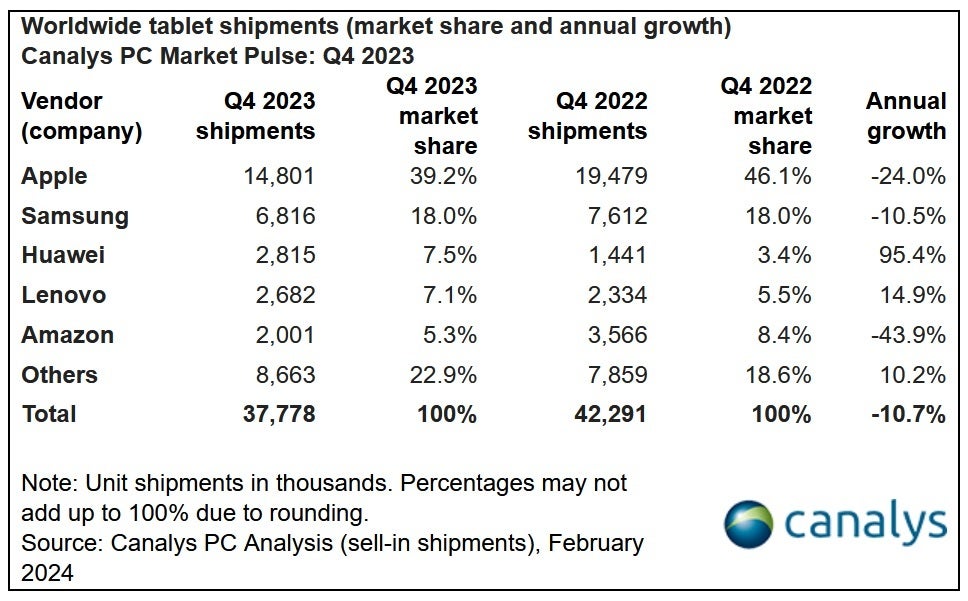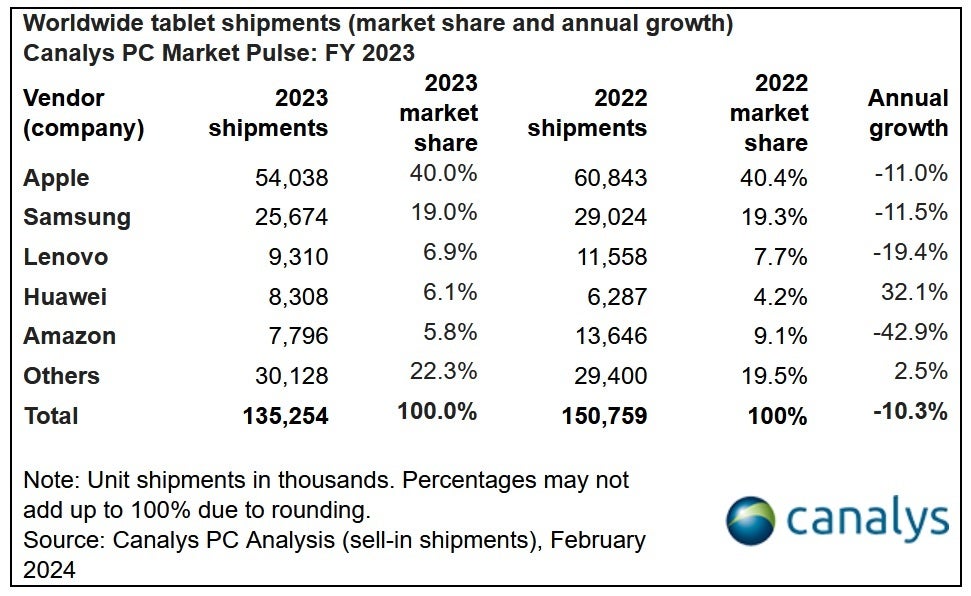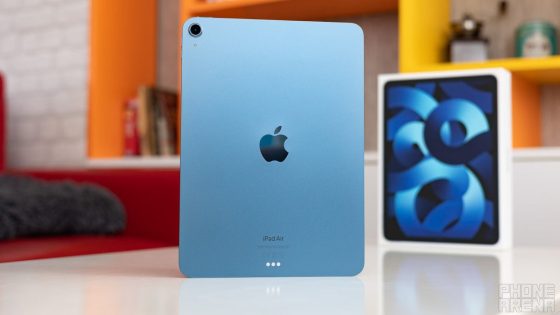Since the end of the pandemic, the global tablet market has suffered from a lack of demand. Of course, it didn't help matters that Apple, for the first time since the launch of the first generation iPad in 2010, went an entire year without introducing a new iPad model. During the pandemic, demand for tablets increased as employees turned to these devices to help them get their jobs done during the day and students used their tablets to attend virtual classes. During the evening, the tablets were used by the two to stream entertainment and play games.
According to data published by
Canalys, global tablet shipments declined by more than 10% during the fourth quarter of 2023 (a decline of 10.7%) and for all of 2023 (a decline of 10.3%). In the quarter from October to December 2023, 37.8 million tablets were shipped. Compare that to the 42.3 million tablets shipped during the fourth quarter of 2022.
Apple's fourth-quarter global tablet market share declined 6.9 percentage points to 39.2%
For the final quarter of 2023, Apple led the way with shipments of 14.8 million iPad units, down 24% from the 19.5 million the company shipped during the same quarter in 2022. This performance led to a sharp decline in Apple's global market share, from 46.1% in the fourth quarter of 2022 to 39.2% during the fourth quarter of last year.
The iPad had a rough fourth quarter last year
Samsung comes far behind with 6.8 million tablets delivered in the last three months of 2023. This figure is down 10.5% compared to the 7.6 million tablets delivered by Sammy in the fourth quarter of 2022. Despite the Huge year-over-year drop in shipments, Samsung's market share in the global tablet market remained the same at 18%, reflecting the poor state of the global tablet market over the past few years. three months.
Huawei was the big winner as its tablet shipments soared 95% on an annual basis in the fourth quarter to 2.8 million. During the same quarter of the previous year, the company shipped 1.4 million tablets. The company's share of the global tablet market more than doubled from 3.4% in Q4 2022 to 7.5% in Q4 2023. Right behind Huawei was Lenovo. For the fourth quarter of 2023, Lenovo shipped 2.7 million tablets, up 14.9% year-over-year from the 2.3 million shipped in the same quarter in 2022.
The iPad held 40% of the global tablet market in 2023
Amazon is still in the top five despite a 43.9% drop in tablet shipments during the quarter. The company shipped 2 million units in the last three months of last year, compared to 3.6 million between October and December 2022. Amazon's market share declined from 8.4% to 5.3 % on an annual basis.
Huawei shipped more tablets than any company in the 2023 top five outside of Apple and Samsung
For all of 2023, Apple remained in the lead after shipping 54 million iPad units, down 11% from the 60.8 million shipped in 2022. Apple's market share remained stable at 40%, up from 40.4% in 2022. Samsung was next after shipping 25.7 million tablets in 2023, a drop of 11.5%. The company's share of the global tablet market declined from 19.3% in 2022 to 19% in 2023.
A 19.4% decline in tablet shipments in 2023 put Lenovo in third place with 9.3 million units shipped and a 6.9% market share. Huawei increased its tablet shipments by 32.1% in 2023 to 8.3 million units, helping the company finish fourth with a 6.1% market share. Amazon's tablet shipments for 2023 fell 42.9% to 7.8 million, as its share of the global tablet market plunged from 9.1% to 5.8%.
For all of 2023, 135.3 million tablets were delivered, compared to 150.8 million shipped in 2022. This represents a 10.3% decrease on an annual basis. Kieren Jessop, analyst at Canalys, says: “The innovation gap between tablets and other personal computing devices is something that major tablet vendors need to pay attention to. Projects around on-device AI integration in tablets are lagging behind those in PCs and smartphones. will be crucial for providers wanting to deliver a unified and transparent experience across ecosystems. »
Jesson adds: “Elsewhere, this year there will be more emphasis on foldable tablet formats. While shipping volumes will likely remain limited due to the high price of these models, they will provide an opportunity for vendors to showcase user experience benefits for content. consumption, learning and productivity.



















